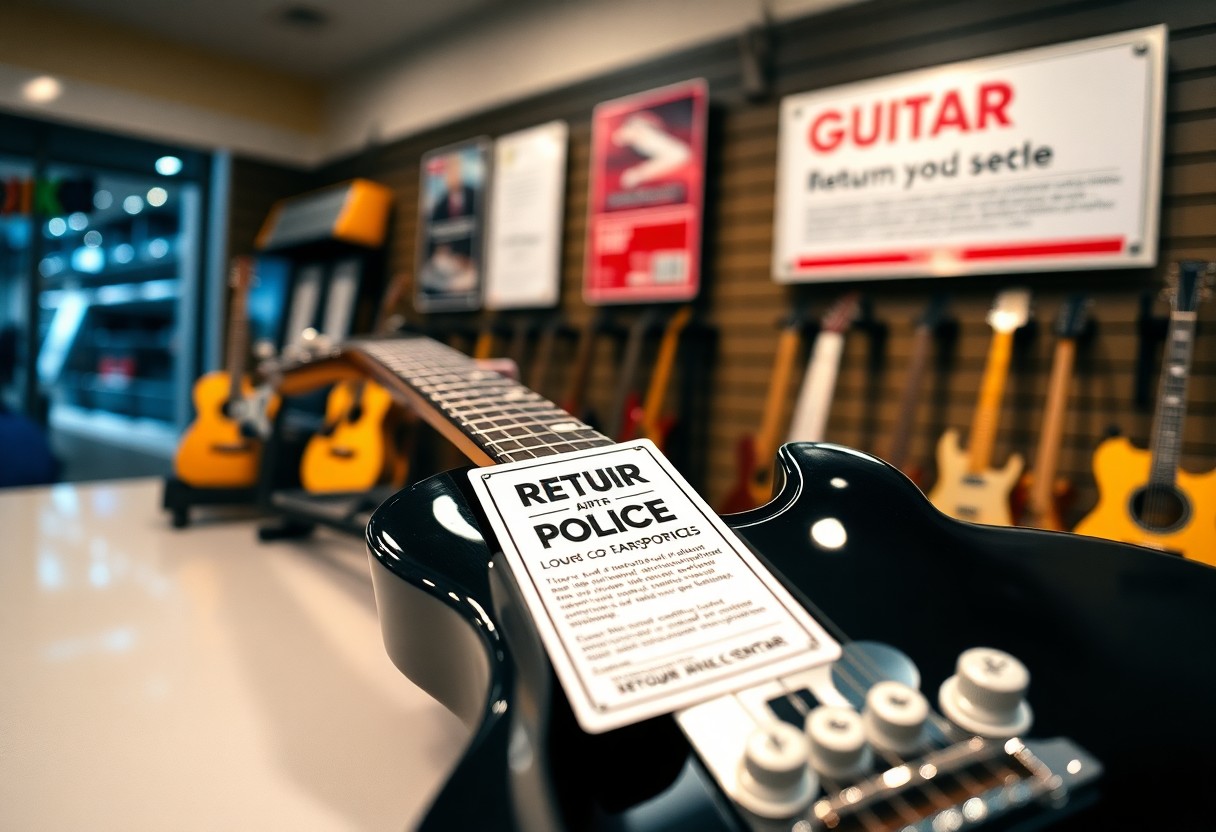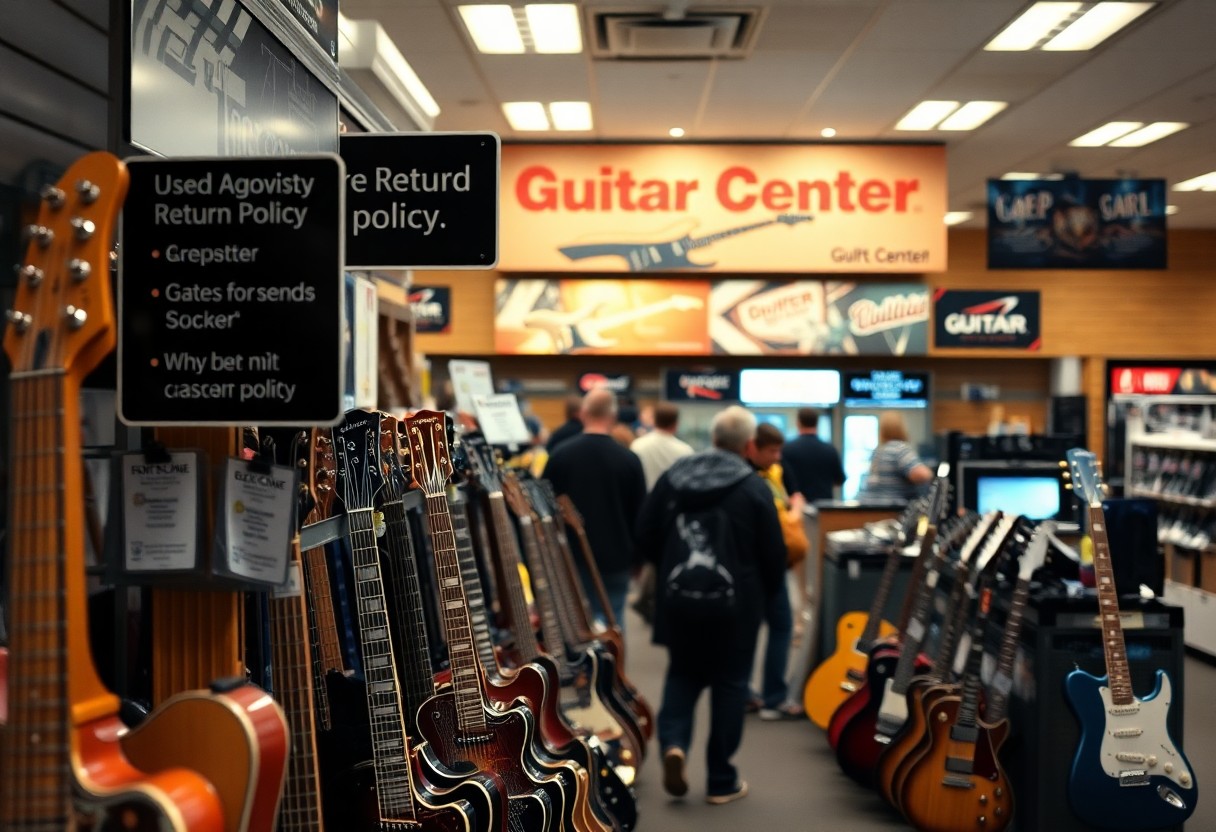Most of your concerns about purchasing used gear at Guitar Center can be addressed by understanding their return policy. You have a window of 30 days to return any used item, provided it is in the same condition as when you bought it. Be aware that certain items, like microphones and software, may not be eligible for returns. Knowing these details empowers you to make informed decisions while shopping, ensuring your purchases align with your needs and expectations.
The Specifics of Guitar Center’s Return Policy
Time Frames and Conditions for Used Gear
You have a generous 30 days from the date of purchase to return used gear at Guitar Center, which aligns with industry standards for music equipment retailers. For most used items, this timeframe gives you ample opportunity to test out your gear and ensure it meets your expectations. Be aware that the item must be in its original condition, with all accessories and packaging included, to qualify for a full refund or exchange.
If you fail to adhere to these conditions, your options may be limited. You might still receive store credit, but this rarely covers the full original purchase price. Keeping track of your receipt is necessary, as it serves as proof of your purchase and starts the clock on your return window.
Restocking Fees and Their Implications
Guitar Center typically imposes a 15% restocking fee on used gear returns, which can significantly impact your final refund amount. This fee applies to most returned items, making it necessary for you to consider the total cost of your purchase before deciding to return an item. For example, if you bought a used guitar for $500 and choose to return it, a 15% fee would mean you only receive $425 back.
The restocking fee serves as a deterrent against frivolous returns and helps maintain inventory quality. Being aware of this cost is crucial. If you believe your purchase might not meet your needs, consider renting the item or opting for a new model that comes with a more favorable return policy.

Navigating Common Scenarios
What to Do If You Change Your Mind
If you decide that your used gear isn’t what you expected, don’t fret. Guitar Center accepts returns within 30 days of purchase for most items, provided they are in the original condition with all included accessories. To initiate the return, head to the store or log into your online account to start the return process. Keep your receipt or order confirmation handy, as you’ll need this for a smooth transaction.
In some cases, items can be returned for store credit or exchanged for something else within the time frame. If you find that you simply don’t gel with a particular guitar or amplifier, consider checking with staff about options for replacements or upgrades that might better suit your playing style.
Handling Defects and Unsuitable Gear
For gear that arrives faulty or displays defects, Guitar Center’s policy is quite accommodating. If your item is not performing as it should, contact the store to arrange for a return or exchange. Most defective products can be exchanged or returned within the same 30-day limit, ensuring you’re not stuck with something that isn’t functional. Additionally, if the item is covered by a manufacturer’s warranty, you may be eligible for repairs or a replacement directly from the manufacturer.
Getting in touch with customer service can streamline the process, especially if you are facing issues with more complex gear like amplifiers or electronic instruments. Be prepared to demonstrate the issue or provide photographic evidence if requested, as this can expedite the resolution and help you secure a replacement faster.
Evaluating the Financial Impact
Cost-Benefit Analysis of Buying Used Gear
Purchasing used gear can lead to significant savings, particularly for high-ticket items such as guitars, amplifiers, or pedals, where you can often find gear priced 30-50% lower than new models. This price reduction allows you to invest in higher-quality brands that may otherwise be out of your budget. For instance, a used Fender Stratocaster might be available for under $800, compared to a new one priced at $1,200 or more. The advantages of buying used gear don’t solely revolve around price; they also include the opportunity to acquire rare or discontinued models that enhance your collection.
However, weighing potential savings against the risk of buying an item with hidden flaws is necessary. Ensuring you have a solid return policy can mitigate this risk. Before finalizing a purchase, examining the item carefully and asking questions about its history helps you determine whether the savings are worth the gamble. If you decide that the used gear isn’t suitable after taking it home, Guitar Center’s return policy typically allows you to return it within 30 days, provided you keep the original packaging and receipt, which should factor into your decision-making process.
Understanding Depreciation for Musical Instruments
Musical instruments depreciate at varying rates, influenced by factors like brand reputation, condition, and market demand. Generally, you can expect most mass-produced guitars to lose value quickly, often around 20% within the first year. However, vintage or high-end instruments may retain their value remarkably well, sometimes appreciating over time if they become sought after or rare. Understanding depreciation helps you assess whether buying used gear is sound from a financial standpoint.
For example, if you buy a premium brand used guitar for $1,000 and it holds its value due to its rarity, you could potentially sell it later for a similar amount. Conversely, purchasing a more common model might lead to a steeper depreciation, where you might only see $600 upon resale. Evaluating the resale potential alongside your purchase can guide you in making smart investments in your musical journey.

Best Practices for Maximizing Value
Inspecting Used Gear Before Purchase
Before finalizing your purchase, a thorough inspection of the used gear ensures you’re making a wise investment. Check for visible wear and tear, including scratches, dents, or rust. Play the instrument if possible, as this allows you to listen for any unusual sounds or issues that could indicate deeper problems, such as faulty electronics or hidden structural damage. Pay attention to the overall feel and functionality; for instance, make sure tuning pegs operate smoothly and pickups work correctly.
In addition to physical inspection, research often helps in making an informed decision. Compare similar models and prices online to know whether the asking price aligns with market values. Tools like Reverb and eBay provide sales histories that can guide your assessment. Familiarizing yourself with the specifications and standard features of the model you’re considering also helps ensure what you’re buying meets your expectations.
Knowing Your Rights as a Consumer
Being aware of your consumer rights is vital when purchasing used gear. Most states have laws that protect you from deceptive practices, meaning products must be sold as advertised and should meet minimum quality standards. In many cases, retailers like Guitar Center will define their own return policies explicitly, which may include 30-day satisfaction guarantees or stipulations on whether modified equipment can be returned. Always ask for a clear explanation of these policies before completing your purchase.
If a used item fails to perform as promised after purchase, many retailers offer extended warranties or return policies. These protections can include full refunds or store credit for items returned within a specified period. Knowing what you’re entitled to empowers you to take action should the need arise. Researching the terms of any return or exchange policy can make a significant difference in your purchasing confidence.
Real-World Experiences and Feedback
Customer Testimonials on Return Policy Outcomes
Your experience with Guitar Center’s return policy can vary widely, depending on individual circumstances. Many customers have reported positive outcomes, particularly when handling defective or unsatisfactory gear. For instance, one customer shared how they were able to return a previously owned amplifier that had internal issues. With a seamless process, they received a full refund, which they then used to purchase a more reliable model. This type of feedback highlights the ability of customers to navigate the return process effectively when needed.
On the flip side, some negative testimonials have emerged regarding delays in processing returns, especially during peak shopping seasons. Instances where customers felt the staff could have been more supportive were noted, particularly in complex return situations involving warranties. While these stories are less frequent, they serve as a reminder that even established return policies can occasionally fall short in execution and customer service.
Expert Insights: The Value of Warranty and Support
Expert opinions emphasize that the significance of warranties and support cannot be overstated when purchasing used gear. Many professionals recommend paying attention to the length and terms of a warranty, as these can greatly influence your overall satisfaction and peace of mind with your purchase. For example, a one-year warranty might cover vital repairs, while a return policy that extends beyond 30 days can provide you with additional time to scrutinize your gear’s performance in a real-world setting. Having this backing not only protects your investment but also illustrates a retailer’s commitment to customer satisfaction.
In the competitive landscape of music gear sales, warranties can serve as a key differentiator between brands and retailers. A solid warranty coupled with responsive customer support fosters trust and reassures you that, should any issues arise, you are not left to navigate them alone. Experts advocate for a thorough review of warranty terms before purchase, as it can save you from unforeseen costs and frustrations down the road.
Summing Up
Following this, understanding the return policy for used gear at Guitar Center is crucial for ensuring a satisfactory purchase experience. If you find that the used guitar or equipment does not meet your expectations, you have the option to return it within a specified period, usually 30 days, provided it’s in its original condition with all accessories and packaging. This policy allows you to shop with confidence, giving you the chance to test the gear without the worry of being stuck with an unsatisfactory purchase.
When considering a return, make sure to keep your receipt and any included documentation, as these will be necessary for processing your return. Familiarizing yourself with the details of the return policy will empower you to make informed decisions about used gear. By being aware of these guidelines, you can effectively manage your investments and enhance your overall experience at Guitar Center.
FAQ
Q: What is the return policy for used gear at Guitar Center?
A: Guitar Center allows returns on used gear within 30 days of purchase with a receipt. Items must be in their original condition, and some restrictions may apply based on the specific item.
Q: Can I return a used instrument if I no longer like it?
A: Yes, you can return a used instrument within 30 days of the purchase. It must be in the same condition as when it was purchased, and you must provide the original receipt for the return to be processed.
Q: Are there any exceptions to the return policy for used gear?
A: Yes, certain items such as clearance or special sale items may have different return policies. Always check the specific return guidelines provided at the time of purchase to ensure compliance.